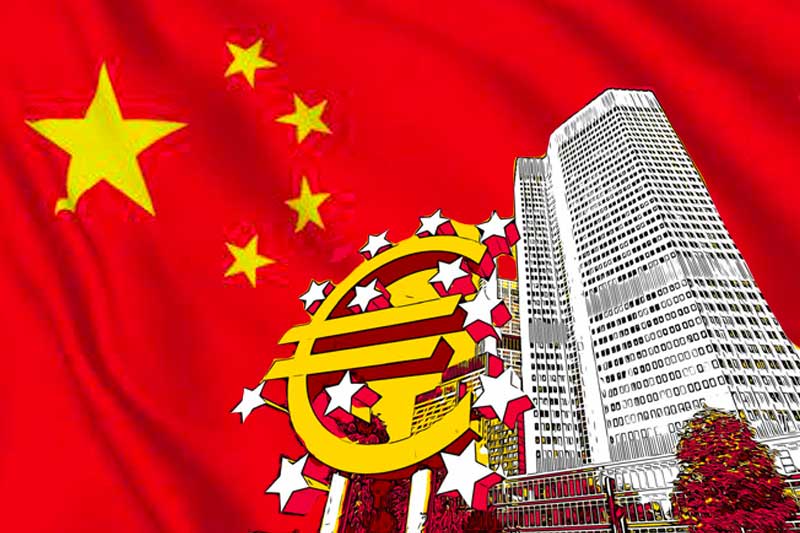La Bce apre gli occhi, il gigante è sempre più vicino e rischia di schiacciare gli europei. L’Eurozona è travolta dalle importazioni cinesi e si contano già i danni per un terzo del mercato del lavoro, ergo più disoccupazione per noi europei. L’allarme ( e stavolta suona come molto di più) è condensato dalla Banca centrale europea, in una pubblicazione speciale dedicata al tema e dice così: “Le tensioni commerciali con gli Stati Uniti che portano la Cina a esportare di più nell’area dell’euro possono provocare ricadute occupazionali negative, con meno offerte di lavoro per gli europei e quindi più disoccupazione”.
La Cina è problema ormai vecchio ma la questione che rimbalza sui tavoli di Francoforte ora è nuovamente pressante. Lo scrive chiaramente Emanuele Bonini su Eunews , quotidiano online diretto a Bruxelles da Lorenzo Robustelli. “I settori che affrontano una maggiore concorrenza da parte della Cina hanno registrato un calo maggiore nelle offerte di lavoro pubblicate, un segnale di domanda di manodopera più debole”, rilevano i tecnici della Bce. Tra il 2019 e il 2024, si sottolinea a titolo d’esempio, la domanda di manodopera nel settore dei veicoli è diminuita del 55 per cento, mentre il calo dell’industria chimica è stimato al 95 per cento. Il dato preoccupa in prospettiva, visto che la stessa Bce avverte del rischio che la guerra dei dazi innescata dall’amministrazione Trump possa spingere la Repubblica popolare ancora di più verso l’Ue e la sua eurozona.
Questo può essere un bene, certo, nella misura in cui si può compensare una parte del commercio reso più costoso e difficoltoso. Al tempo stesso si rischia di mettere sotto stress”. In fermento è anche il consiglio direttivo dell’Istituto centrale europeo che lo scorso luglio ha messo in pausa i tassi che si è dato appuntamento per l’11 settembre.
Proprio tra un mese esatto, infatti, si riunirà, il consiglio direttivo dell’istituto centrale europeo. La Bce procede step by step, la presidente Lagarde come da linea ormai predefinita, vuole andarci cauta. Un nuovo taglio, forse l’ultimo del ciclo, da parte della Banca Centrale Europea, dovrebbe arrivare nel mese di dicembre. Secondo un sondaggio di Bloomberg, la Bce attenderà fino al mese di Natale per il prossimo taglio dei tassi di interesse, una mossa finale che andrà così chiudere il ciclo di allentamento nella zona euro (cominciato nel giugno del 2024). Speriamo che l’aria delle vacanze porti buoni consigli a Madame Lagarde e buon vento in Eurozona.
China is getting closer, ECB is now trembling over eurozone employment.
The ECB is waking up: the giant is getting closer and threatens to crush Europeans. The Eurozone is overwhelmed by Chinese imports, and a third of the labor market is already being affected, resulting in higher unemployment for us Europeans. The alarm (and this time it sounds much worse) is summed up by the European Central Bank in a special publication dedicated to the topic, which states: “Trade tensions with the United States, which are leading China to increase exports to the Eurozone, may have negative employment consequences, with fewer job openings for Europeans and therefore higher unemployment.”
China is an old problem, but the issue bouncing around the Frankfurt table is now pressing again. Emanuele Bonini clearly writes in Eunews, an online newspaper directed in Brussels by Lorenzo Robustelli. “Sectors facing greater competition from China have seen a greater decline in job postings, a sign of weaker labor demand,” note the ECB experts. Between 2019 and 2024, for example, labor demand in the vehicle sector fell by 55 percent, while the decline in the chemical industry is estimated at 95 percent. This data is worrying for the future, given that the ECB itself warns of the risk that the trade war unleashed by the Trump administration could push the People’s Republic even further toward the EU and its eurozone.
This can be a good thing, of course, to the extent that it can offset some of the more expensive and difficult trade. At the same time, it risks putting things under stress.” The governing council of the European Central Bank is also in turmoil, having put interest rates on hold last July, with a meeting scheduled for September 11th.
In exactly one month, the Governing Council of the European Central Bank will meet. The ECB is proceeding step by step, and President Lagarde, as per her now predetermined line, intends to proceed cautiously. A new cut, perhaps the last of the cycle, from the European Central Bank is expected in December. According to a Bloomberg survey, the ECB will wait until Christmas for its next interest rate cut, a final move that will thus close the easing cycle in the eurozone (which began in June 2024). Let’s hope the holiday season brings good advice to Madame Lagarde and fair winds to the eurozone.


